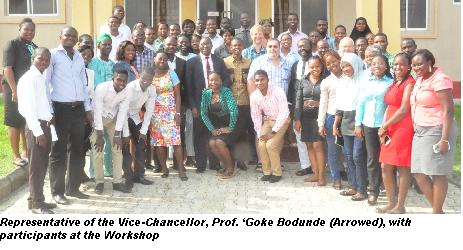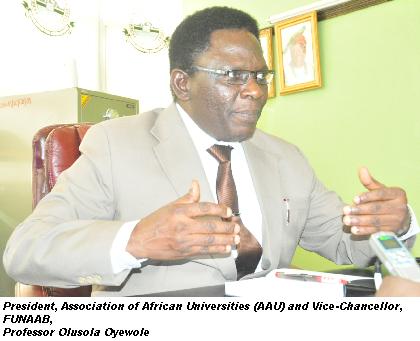The President, Association of African Universities (AAU) and Vice-Chancellor of the University, Professor Olusola Oyewole, has restated the call for better funding and academic standards for African Universities, noting that the quality of teaching and research in such institutions remain a big challenge leading to students and staff unrests, poor infrastructure and migration of talented academics to developed countries. 
Professor Oyewole, who made this call during the 1st Soils of Forest Islands in Africa (SOFIIA) Workshop on “Scientific Methods and Communication, Scientific Proposals and Ecosystems of Africa”, held in the University, lamented that despite the African Union’s commitment to the allocation of at least, one per cent of the Gross Domestic Product (GDP) of its countries to Research and Development (R & D), only very few countries had complied, resulting in low research publications.
The Vice-Chancellor was represented at the occasion by the immediate past Dean, College of Plant Science and Crop Production (COLPLANT), Professor ‘Goke Bodunde, who commended the sponsors of the workshop, the Royal Society for pushing forward capacity building activities and ensuring that students from developing countries benefited from them, adding that research activities in FUNAAB, which is one of the hosts of the SOFIIA project cut across all the various aspects of agriculture, soil, environment and beyond. According to him, FUNAAB is reputed for research and academic excellence, effective grants management and conducive atmosphere, assuring the sponsors of the SOFIIA project that the University was capable of executing the project.
The Project Manager of SOFIIA, Professor Jon Lyloyd of the Imperial College, United Kingdom, disclosed that the SOFIIA project was sponsored by the Royal Society through the United Kingdom Department for International Development (UK DfID), African Capacity Building Initiative with special focus on Masters and Doctorate students in Universities in Africa to effectively engage in research and on how to communicate the research findings to the international community.
The Principal Investigator, Nigeria, Dr. Jamiu Azeez, stated that the DfID African Capacity Building Initiative was aimed at strengthening the research capacity of Universities and research institutions by supporting the development of sustainable research networks. He further disclosed that the project was manned by a consortium of scientists from London, Nigeria, Ghana and Burkina Faso. He added that the project was capable of achieving the objectives of facilitating sustainable multi-disciplinary partnership between research groups in sub-Sahara Africa and the UK; strengthening research and training capacity in sub-Sahara African institutions of Higher Education through skills transfer between partner organisations of the research consortia; producing a cadre of young, talented researchers through integrated Ph.D scholarships and shared supervision of postgraduate students between the UK-based and African consortia members and evaluating the contributions of the Africa initiative to supporting Universities and institutions in Africa in developing sustainable research and training capacity.
In another development, the AAU President, Professor Olusola Oyewole, has disclosed that the national regulatory agency of any country has the right to offer advice on the quality of educational delivery that its citizen could subscribe to. Professor Oyewole stated this while responding to questions posed to him by an education reporter recently. He noted that the current stance of the National Universities Commission (NUC), on the regulation of academic programmes in Universities, was based on its perception of the expected standards in educational delivery, saying that the commission desired the best for the nation. “The non-acceptability of online degrees by the NUC does not mean that on-line mode of educational delivery is bad. Indeed, many institutions now combine both face-to-face delivery with on-line delivery modes, for effective teaching and learning”, Professor Oyewole said. “A study of the fraudulent on-line degree providers reveals that the process of examination is compromised and credits are offered without actual learning. Some of these on-line degree providers are ‘degree-mills”, where degrees are offered for cash without learning. In some dubious on-line courses that ought to run for three to four years in conventional programmes, they are offered for six months. Until the on-line delivery providers can provide assurance of the quality of their contents and process, their credibility will continue to be in doubt”, he added.
The Don, however, disclosed that the decision of the NUC will not affect well-structured distance learning programmes of institutions who already have in place, good quality control activities for their course materials, delivery and examination processes as many of the distance learning programmes had already included face-to-face contact hours with the students while the delivery mode may be on-line, the examination process still demanded that the students were physically present for examinations.
